Serving 606 students in grades 6-8, Stanley Middle School ranks in the top 50% of all schools in North Carolina for overall test scores (math proficiency is top 50%, and reading proficiency is top 50%).
The percentage of students achieving proficiency in math is 55% (which is higher than the North Carolina state average of 51%). The percentage of students achieving proficiency in reading/language arts is 55% (which is higher than the North Carolina state average of 50%).
The student:teacher ratio of 16:1 is higher than the North Carolina state level of 15:1.
Minority enrollment is 38% of the student body (majority Hispanic), which is lower than the North Carolina state average of 57% (majority Black).
Quick Stats (2025)
- Grades: 6-8
- Enrollment: 606 students
- Student:Teacher Ratio: 16:1
- Minority Enrollment: 38%
- Overall Testing Rank: Top 50% in NC
- Math Proficiency: 55% (Top 50%)
- Reading Proficiency: 55% (Top 50%)
- Science Proficiency: 82% (Top 20%)
- Source: National Center for Education Statistics (NCES), NC Dept. of Education
Top Rankings
Stanley Middle School ranks among the top 20% of public schools in North Carolina for:
Category
Attribute
Science Proficiency
School Overview
Stanley Middle School's student population of 606 students has declined by 6% over five school years.
The teacher population of 39 teachers has stayed relatively flat over five school years.
Grades Offered
Grades 6-8
Total Students
606 students
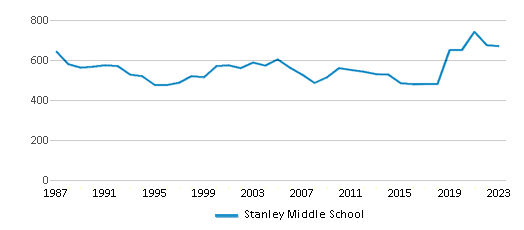
Gender %
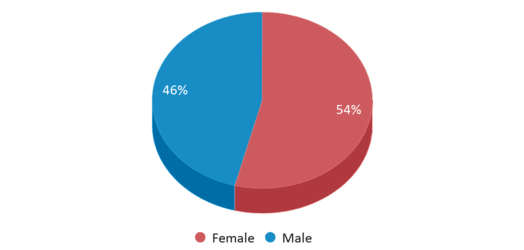
Total Classroom Teachers
39 teachers
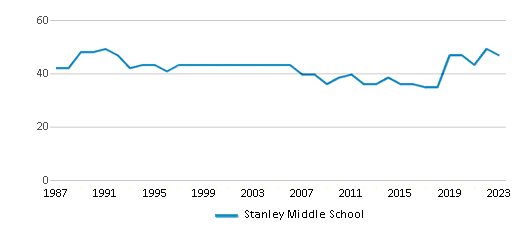
Students by Grade
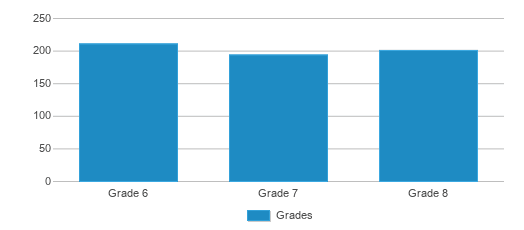
School Rankings
Stanley Middle School ranks within the top 50% of all 2,617 schools in North Carolina (based off of combined math and reading proficiency testing data).
The diversity score of Stanley Middle School is 0.57, which is less than the diversity score at state average of 0.71. The school's diversity has stayed relatively flat over five school years.
Overall Testing Rank
#1005 out of 2617 schools
(Top 50%)
(Top 50%)
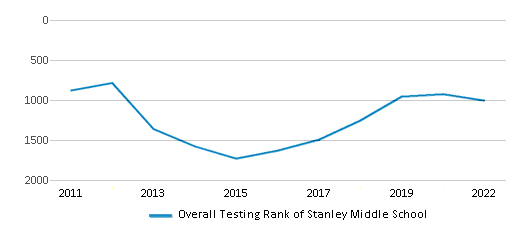
Math Test Scores (% Proficient)
55%
51%
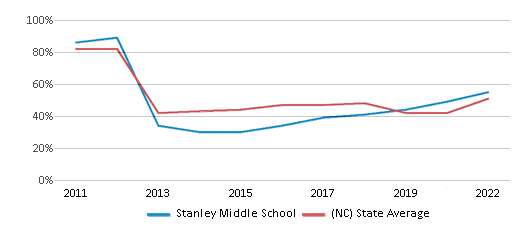
Reading/Language Arts Test Scores (% Proficient)
55%
50%
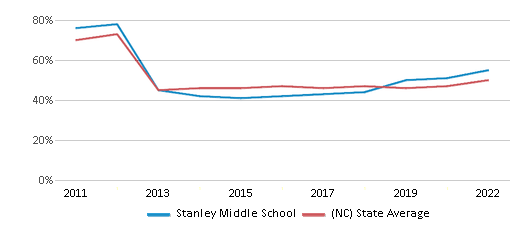
Science Test Scores (% Proficient)
82%
63%
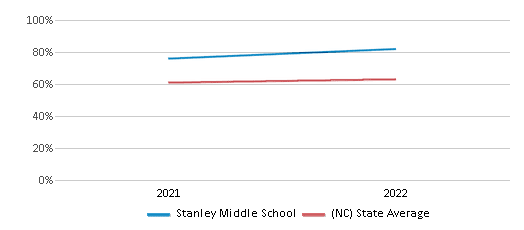
Student : Teacher Ratio
16:1
15:1
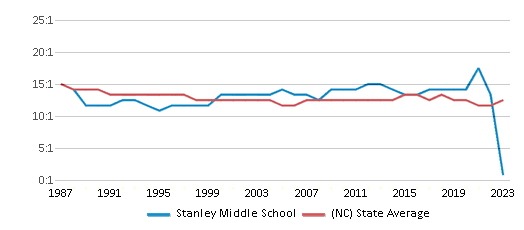
American Indian
n/a
1%
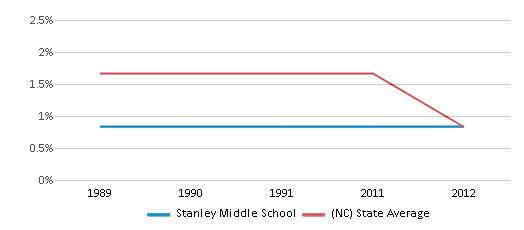
Asian
1%
4%
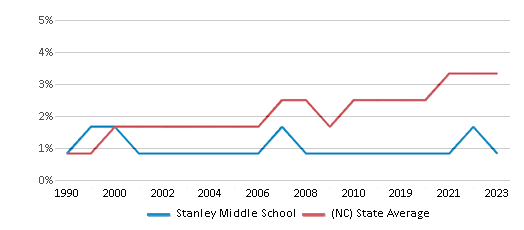
Hispanic
18%
21%
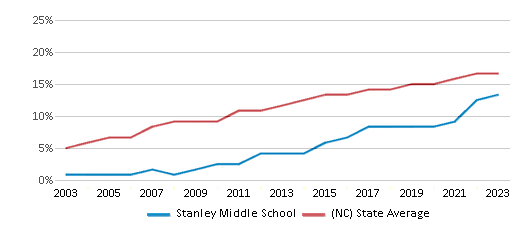
Black
13%
25%
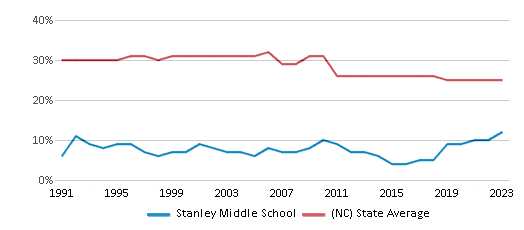
White
62%
43%
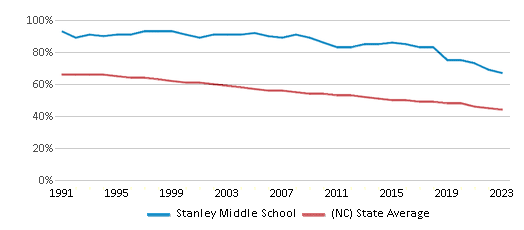
Hawaiian
n/a
n/a
Two or more races
6%
6%
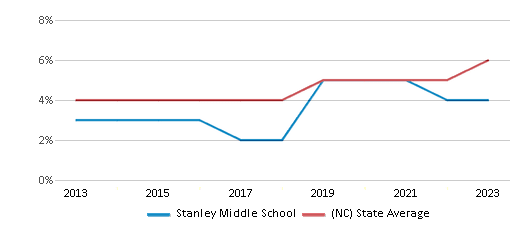
All Ethnic Groups
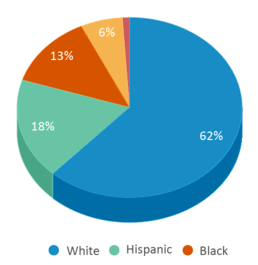
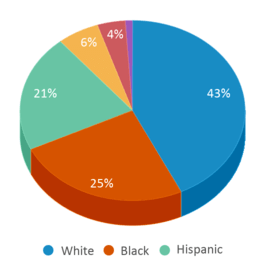
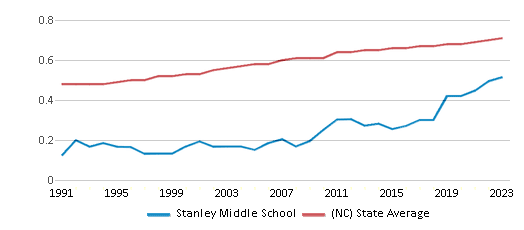
Participates in the National School Lunch Program (NSLP)
Yes
Eligible for Free Lunch
100%
68%
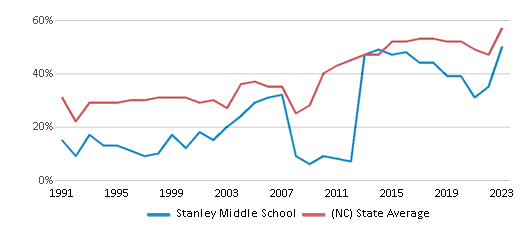
Eligible for Reduced Lunch
6%
3%
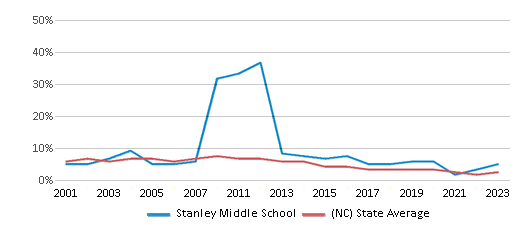
School Statewide Testing
School District Name
Source: National Center for Education Statistics (NCES), NC Dept. of Education
Profile last updated: 02/09/2025
Frequently Asked Questions
What is Stanley Middle School's ranking?
Stanley Middle School is ranked #1005 out of 2,617 schools, which ranks it among the top 50% of public schools in North Carolina.
What schools are Stanley Middle School often compared to?
Stanley Middle Schoolis often viewed alongside schools like Mount Holly Middle School by visitors of our site.
What percent of students have achieved state testing proficiency in math and reading?
55% of students have achieved math proficiency (compared to the 51% NC state average), while 55% of students have achieved reading proficiency (compared to the 50% NC state average).
How many students attend Stanley Middle School?
606 students attend Stanley Middle School.
What is the racial composition of the student body?
62% of Stanley Middle School students are White, 18% of students are Hispanic, 13% of students are Black, 6% of students are Two or more races, and 1% of students are Asian.
What is the student:teacher ratio of Stanley Middle School?
Stanley Middle School has a student ration of 16:1, which is higher than the North Carolina state average of 15:1.
What grades does Stanley Middle School offer ?
Stanley Middle School offers enrollment in grades 6-8
What school district is Stanley Middle School part of?
Stanley Middle School is part of Gaston County Schools School District.
School Reviews
5 7/17/2015
Great teachers. I have a child in 8th grade and one coming into 6th grade. No problems. Wonderful teachers. kids love them. If your child is interested in music. They have one awesome band teacher. She went to Stanley and her love for music is great. She has really made my daughter love for music come out. She loves it and now I am looking at my 2nd child starting.
5 11/2/2009
a. All the teachers have graduated from high school and are great to work with. They teach their subject well and stay on subject.
b. As a student, you get to choose either spanish and art, band, or chorus. You have your choice, but you can't do all three. Stanley Middle has basketball, football, soccer, track, golf, softball, baseball, and volleyball. You can pick from all those choices and have fun practicing and playing with the team even though sixth graders are not allowed to play.
c. Acedemic and athletic awards are great. Period.
d. The facilities (keep in mind that some of the kids parents attended this school and it has not been renovated since) is fair, but at least they have great janitors that thake their jobs very seriously!
e. The level of parent involvement is great! They have a PTO (Parent Teacher Organization) that helps set up super school dances and awesome fundraisers!
Review Stanley Middle School. Reviews should be a few sentences in length. Please include any comments on:
- Quality of academic programs, teachers, and facilities
- Availability of music, art, sports and other extracurricular activities
Recent Articles

What Is A Charter School?
Explore the world of charter schools in this comprehensive guide. Learn about their history, how they operate, and the pros and cons of this educational innovation. Discover key facts about charter schools, including admission policies, demographics, and funding, as well as what to look for when considering a charter school for your child.

10 Reasons Why High School Sports Benefit Students
Discover the 10 compelling reasons why high school sports are beneficial for students. This comprehensive article explores how athletics enhance academic performance, foster personal growth, and develop crucial life skills. From improved fitness and time management to leadership development and community representation, learn why participating in high school sports can be a game-changer for students' overall success and well-being.

February 05, 2025
Understanding the U.S. Department of Education: Structure, Impact, and EvolutionWe explore how the Department of Education shapes American education, from its cabinet-level leadership to its impact on millions of students, written for general audiences seeking clarity on this vital institution.









